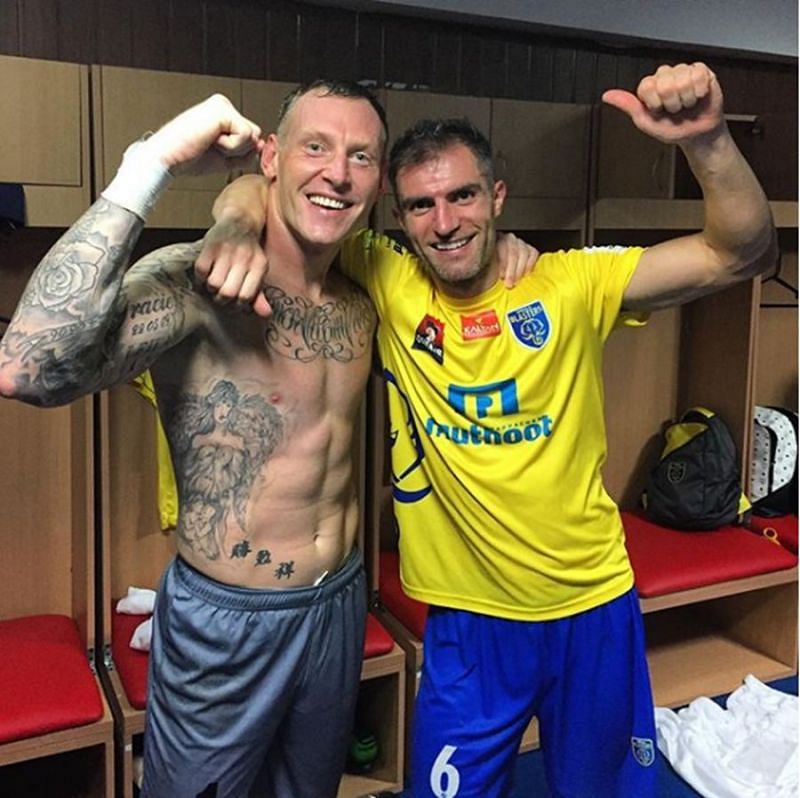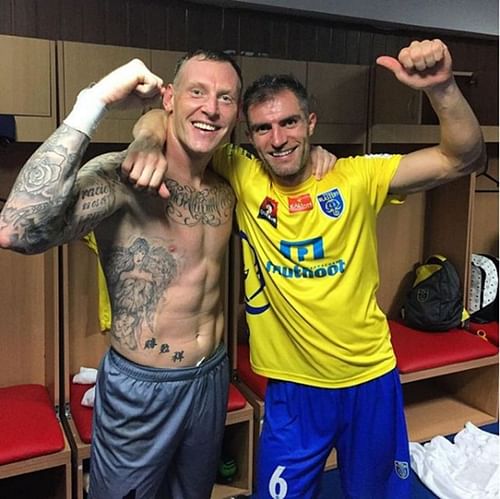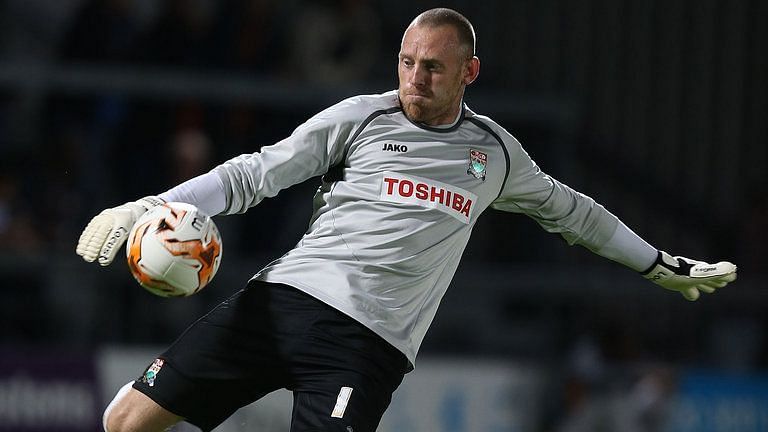
Former Arsenal goalkeeper Graham Stack discusses his exciting Indian Super League sojourn

Season five of the Indian Super League is almost a month old and there have already been a lot of interesting results thrown up. Every year, fans look forward to the ISL in expectation as they hope that some new Indian talent will be discovered, in addition to the signings of foreign players that go on to do well and forge a bond with supporters.
One such foreign player who was a part of the league in the past is former Arsenal goalkeeper Graham Stack, who enjoyed a good season with Kerala Blasters in 2016, reaching the finals. Apart from his time in the ISL and with the Gunners, where he was famously part of the Invincibles squad, Stack also spent time with clubs like Reading, Leeds, Hibernian and Barnet, before eventually taking a coaching role with Watford in September this year.
The former Republic of Ireland youth international has spoken in detail about the experience of being a foreign player in India - the expectations surrounding you, how to deal with the facilities on offer and the potential Indian football has to grow in a revealing interview.
When asked how he decided to move to India for the league after former Reading coach Steve Coppell called him, Stack said, "It wasn't life-changing money, by any means. It was a four-month contract that probably generated an 18-month salary for me over here."
“But the chance to embrace a new culture, a new environment, on the other side of the world, I just thought: 'Wow, what a fantastic opportunity.'"
The league in India famously has a quota system, where currently the rules mandate that a club have a maximum of 18 Indian players in the squad and a maximum of seven foreign players in the squad. When Stack signed on, the number of foreigners allowed in the squad were 11 and a team could field up to six foreigners at a time, a number which has now been brought down to five.
Talking about this change, he elaborated on both the pros and the cons, saying, "I do believe that it's a very good rule if you're going to try and bring on and develop young, Indian talent. They have to play, they've got to play."
“But I think they've gone too far now by restricting it too much. They're going to lose a lot of experience, and know-how and knowledge, and I think a lot of that is what helped the Indian players develop - not just through coaching but through working with good players."
The 37-year-old went on to discuss how big the league could become, saying, "I think it needs a little bit more exposure in this part of the world. It will struggle as the Chinese league has. You can throw millions and millions at it but it doesn't necessarily mean the league is going to become a success if you're going to sign a load of marquee players.
“The quality of football has to be something that people want to watch. There has to be good quality players on show. The idea of cutting the foreign players will restrict the amount of interest that they're going to get in this part of the world."
As an international visiting another country to play football, there is a lot of time on the hands of players who try and use that time to know their teammates better and absorb the culture of the land.
Talking about the same, he explained how his time was spent, saying, "The hotel was unreal, five-star, it was beautiful. However, when you left the hotel there was very little to do. We had one Costa coffee in the shopping centre close to us but that was pretty much it."

Though the travel involved for matches was hectic, Stack discussed how he enjoyed it, explaining how he got to see many interesting places and explore different parts of India, something he was very happy to be given the chance to do so.
He said, "I loved seeing places. We went to Chennai, but didn't get a chance to do much. In Delhi we were there for the Diwali fireworks and celebrations. We had a game of cricket with a load of local lads from the community – it was us against about 60 different kids."
"And then in Calcutta we went to the races, the Calcutta Derby, which was good fun. We managed to see a few things. When you were training so much and travelling, the rest was key because the games came thick and fast."
Stack was part of the team that was then partly owned by probably the greatest cricket batsman of all-time, Sachin Tendulkar. When asked how it was dealing with a famous owner and how the players were treated, he described the experience in detail, saying, "You'd get treated like movie stars at times because of who you were connected to with your clubs."
“He didn't travel with us, but there would be an army escorting Sachin to the games. Other teams had Bollywood stars that owned their clubs, and they'd bring a lot of glitz and glamour to the game as well. It's such a hugely populated culture, the marketing is done very cleverly over there to try and build brands.”
He was also asked about the fact that despite the money involved in the Indian Super League, there was a distinct lack of facilities that are important to help the game grow. In response to that, he said, "I remember walking out on the training pitch on the first day and there were about 20 old Indian ladies with buckets, on their hands and knees, dipping their hands in the water and spraying it with their fingers. That's how they were watering the pitch.
“I was thinking: 'Where's the hoses, the drainage, the pop-ups and all that?’ But it just wasn't there. How can a country with this much money, in certain areas at least, be so behind? The league was generating so much interest and so much money, I couldn't get my head around it."
The one good thing players always appreciate is the chance to interact with colleagues from different cultures and use that to develop a strong understanding and feeling of brotherhood in the dressing room. In addition to the Indian players, there were players from Haiti, Chad, Spain, France, Ivory Coast and Senegal - a true melting pot of cultures.
Speaking about that, he said, "We had a real mix of different backgrounds, footballing experiences, cultures, religions. It was a beautiful blend. We built morale on the training ground, with old v young games, internationals v non-internationals, foreigners v Indians. We all got on great."
When asked about the Indian players and how he played the role of a mentor to many of them, Stack explained the importance of what he did, saying, "I think they looked to us for a bit of guidance. They were always intrigued and would want answers for questions, like what we were eating, what we were doing in the gym, why did we have a foam roller? At times, they were flabbergasted by the work we used to do, and I think we had to change their mentality.”
He then also spoke about the fact that many of the players were quite talented, saying, "Individually, there were some very good Indian players over there. There were certainly a couple in my team that would have been able to come over here and play in the Championship. But then there were others that would find it difficult to get into a League Two side, a bit like the Scottish League in that sense."
Stack was full of praise for the support the team received in Kerala, saying, "We had 80,000 people and, at times, you'd think the stadium was just going to collapse.I’ve never experienced anything like it, and I never will. Real fanatics, but that was Kerala. Believe it or not, football is their primary sport, not cricket. That's saying something."
The Blasters did very well that season, using their record at home to reach the playoffs, before subsequently going on to lose in the final on penalties. Stack saved a penalty in the shootout but the team could not convert their last two attempts. He spoke about his experience in India, saying, "It would have been a fairytale [to win]. But it was about more than winning the trophy. It was about everything that came with it."
“It wasn't until you started putting a few things down on paper on the plane on the way home that you think: 'Blimey, what an experience.’ What I experienced off the pitch with that group of players will always mean more to me than what happened on it. It surpassed all my expectations.”
The former goalkeeper's experience of playing in India can most definitely be used as a guide for foreign players in India, as to what they can expect. With the league now much longer than 2016 when Stack was part of it, when it lasted just under three months, it is much more in-tune with the European club season, as the entire schedule almost lasts nine to ten months.